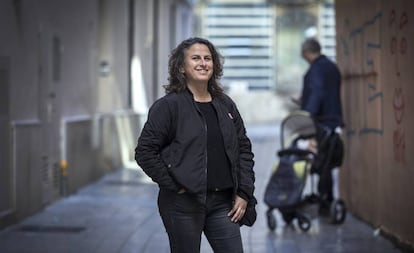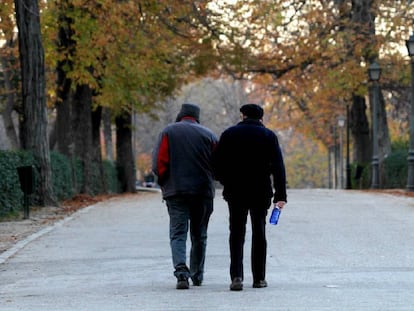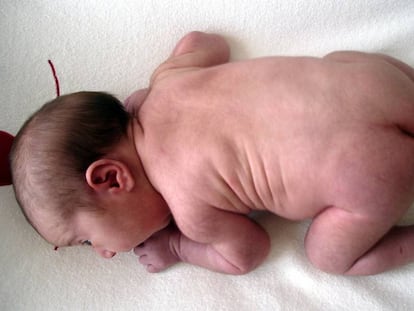The Spanish women who are opting out of motherhood
The decision not to have children often entails condescending looks and lack of support from society


Teresa Cebri¨¢n meets a lot of people through her job as culture coordinator, and sooner rather than later they inevitably ask if she has children. ¡°When you say no, they look at you with pity, apparently thinking, poor thing, she probably wasn¡¯t able to.¡±
It¡¯s an assumption that has nothing to do with the reality of this 56-year-old who defines herself as radically independent. ¡°When you assure them that you are not a mother because you didn¡¯t want to be, they look surprised.¡±
In most European and western countries, the number of women who don¡¯t want children is around 10%, and Spain is on a par with them
Albert Esteve, Center for Demography Studies
Cebri¨¢n is one of a growing number of women who have no children out of personal choice, at a time when there is a sharp drop in Spain¡¯s birth rate ¨C in the first half of last year, Spain had the fewest births (180,000) since 1941, when record-keeping began.
¡°In most European and western countries, the number of women who don¡¯t want children is around 10%, and Spain is on a par with them,¡± says Albert Esteve, director of the Center for Demography Studies at the Autonomous University of Barcelona (UAB). Esteve adds that infertility levels are higher, but this is due to work-related or underlying physical causes.
Besides having to put up with condescending looks when she explains her decision not to become a mother, Cebri¨¢n ¨C who coordinates the Valencia Scriptwriters¡¯ Association ¨C also has the arduous task of explaining her life choice to her partners. ¡°I don¡¯t think they quite believe it, and although they say they¡¯re all right about it, in my experience, sooner or later they want them [children].¡±

Cebri¨¢n says that she belongs to a generation of women who have an independent professional life, who have had access to birth control and information early on, and who have been able to decide for themselves. ¡°Those of us who were born at the end of the 1950s or start of the 1960s have taken control of our lives. And I¡¯m referring to different social groups, not just the elite. Some will have decided not to be mothers because it interferes with their careers, because of work-family balance issues or for other reasons, but for a lot of us it¡¯s simply because we don¡¯t want to,¡± she says.
¡°I have neither the patience, the time nor the inclination to have children,¡± says photographer Eva M¨¢?ez. But, at 48, she says she is under pressure from her peer group to become a mother, something that didn¡¯t happen during her twenties and thirties. ¡°Now that I am older, they insist that I still have time.¡±
This social pressure is a constant element in the lives of women like Teresa and Eva. They are told they will regret it; they are advised to freeze their eggs. Another stock phrase is, ¡®But you¡¯re are still young enough!¡¯ ¡°It¡¯s as though I might be less clear about not wanting children because I¡¯m young,¡± says Vanesa Machuca, 38, who works in human resources in Ja¨¦n.
Machuca points out that it is hardly surprising the birth rate is so low in Spain. ¡°Salaries are among the lowest in Europe,¡± she says. ¡°I have friends who don¡¯t have children because they can¡¯t afford to. You¡¯re either a manager on a high salary that allows you to pay someone to look after them when you¡¯re not home, or you have a different profile and you have to reduce your hours or limit your career,¡± she says.
Those of us who were born at the end of the 1950s or start of the 1960s have taken control of our lives
Teresa Cebri¨¢n, cultural coordinator
According to Alicia Kaufman, a sociology professor at Alcal¨¢ de Henares University, the empty cradle syndrome is replacing the empty nest syndrome. ¡°Women are freer to choose,¡± she says. ¡°One of the key factors when deciding whether to have children is professional development, mainly because, apart from a few laudable exceptions, companies punish motherhood. There is also job mobility to consider, and the lack of state support. During the Franco era, Spain had one of the highest birth rates in the world ¨C the dictatorship rewarded large families ¨C but after 1976, there was a massive decline. Why? The sale of contraceptives was legalized and women accessed planned parenthood. Women were also absorbed into the workplace en masse and religious factors became less significant.¡±
But those who have decided not to have children do not see themselves reflected in society. ¡°Most of the women around me have children,¡± says Laura Mu?oz, 47, who is skeptical about the ¡°mysticism¡± that infuses women who are mothers late in life. ¡°Those who don¡¯t either haven¡¯t been able to or are not in a relationship.¡±
A social worker whose job revolves around minors, Laura complains about the lack of visibility for those who choose not to become mothers. ¡°I had made my mind up by the age of 30, but society is designed for us all to be cut from the same cloth,¡± she says.
At the same time, society has made it easier to value our freedom. ¡°We have developed a need to be more comfortable with ourselves, to reorganize our list of priorities and appreciate our freedom,¡± says Esteve. ¡°You no longer need children or a partner to be fulfilled because society fulfills you in other ways.¡±
Having children has simply not been an option for Mar¨ªa Llopis, 50, who works in a car hire company in Benissa, Alicante. But when people say she is over the hill, it does not get her down. ¡°I enjoy my time,¡± she says. ¡°I have relationships now and again but there hasn¡¯t been the option of either a long-term partner or kids. It¡¯s what life has thrown at me and I¡¯m not going to get frustrated about it or feel I have missed out.¡±
Andr¨¦s Moya, a professor of genetics at the University of Valencia and a doctor of biology and philosophy, says that the biological clock definitely exists but that there will always be women who resist it.
Esteve, meanwhile, points out that despite the low birth rate in Spain and the lack of state support ¨C unlike in some northern European countries ¨C choosing to have children and form a family is still the paradigm.
Consequently, people are still suspicious of those who choose to opt out. ¡°I know that socially it is considered very selfish and I know that there are problems with birth rates, but no,¡± says Ana Ambra, 43. ¡°I don¡¯t want that kind of responsibility in my life. I just don¡¯t want it.¡±
English version by Heather Galloway.
Tu suscripci¨®n se est¨¢ usando en otro dispositivo
?Quieres a?adir otro usuario a tu suscripci¨®n?
Si contin¨²as leyendo en este dispositivo, no se podr¨¢ leer en el otro.
FlechaTu suscripci¨®n se est¨¢ usando en otro dispositivo y solo puedes acceder a EL PA?S desde un dispositivo a la vez.
Si quieres compartir tu cuenta, cambia tu suscripci¨®n a la modalidad Premium, as¨ª podr¨¢s a?adir otro usuario. Cada uno acceder¨¢ con su propia cuenta de email, lo que os permitir¨¢ personalizar vuestra experiencia en EL PA?S.
?Tienes una suscripci¨®n de empresa? Accede aqu¨ª para contratar m¨¢s cuentas.
En el caso de no saber qui¨¦n est¨¢ usando tu cuenta, te recomendamos cambiar tu contrase?a aqu¨ª.
Si decides continuar compartiendo tu cuenta, este mensaje se mostrar¨¢ en tu dispositivo y en el de la otra persona que est¨¢ usando tu cuenta de forma indefinida, afectando a tu experiencia de lectura. Puedes consultar aqu¨ª los t¨¦rminos y condiciones de la suscripci¨®n digital.










































